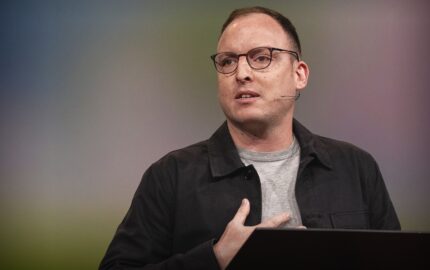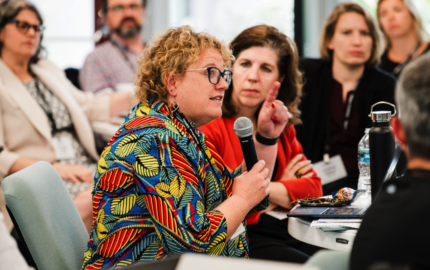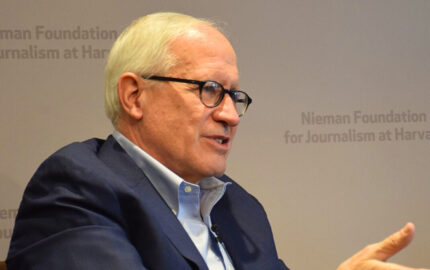Elizabeth Kolbert has been a staff writer at The New Yorker since 1999 with a focus on environmental issues. Her 2015 Pulitzer Prize-winning book, “The Sixth Extinction: An Unnatural History,” posits that human activity has brought the world to its sixth mass extinction event in 500 million years. Her latest book, “Under a White Sky: The Nature of the Future,” examines technological efforts to address the climate crisis.
Kolbert spoke to the Nieman Foundation via Zoom in May about her latest book, the impacts of human action on the environment, environmental justice, and more. Edited excerpts:
After I wrote “The Sixth Extinction,” I felt like I had written myself off the page in a way, because what story could be bigger than that? Here we are, on the verge of a mass extinction. Life goes on, ironically or comically. I started to think about, ‘OK, what are we going to do in response to this rising tide?’—literally and figuratively.
That got me in a roundabout way to a project that became the genesis of the book, nicknamed The Super Coral Project. The premise was: The oceans are fundamentally altered. Reefs are doing very badly. If we want to have reefs at the end of the 21st century, we're going to have to manipulate them. They're not going to survive on their own.
Basically, that idea that we've so fundamentally altered things that to go forward we need to keep altering them, that was the premise and the message from this very, very charismatic woman named Ruth Gates, who was the protagonist of the story that I wrote.
That got me thinking. I started to see that pattern. Wherever you looked, it was like, ‘OK, well, we've screwed that up. Now we're going to have to come up with a way to undo what we've done. That will require a new level of manipulation.’ I started to see that pattern. That is what became the book.
The book was written during the Trump administration, when things looked particularly bleak. Honestly, [the change in administration] doesn't change anything. I want to be frank.
Is anything that Biden is talking about going to happen? I certainly hope so. Is it going to fundamentally alter the fact that we are going to breeze through 1.5 degrees? We're already at 1.5 degrees. We're going to keep breezing through 2 degrees. We don't know what the consequences are going to be, but they could be extremely ugly.
No, I don't think it changes that, fundamentally, at all. I don't want to diminish what the Biden administration is doing. I applaud it.
I think the problem with climate change is you don't get to just say, in 2021, after having not done anything for 50 years, or 200 years, you don't just get to say then, ‘We'd like this to stop.’ That's just not how the geophysics work.
To be honest, there's a lot of confusion out there in the world. Climate change is not terribly complicated, but it's also not easy. A lot of environmental problems that we're used to dealing with dissipate in the human timescale. You stop putting particulate matter into the atmosphere, within a very short amount of time your air is a lot cleaner. You stop putting CO2 into the atmosphere, and I mean stop, genuinely stop, which Lord knows when we're going to do that, you still have a lot of inertia in the system that's going to keep driving these processes forward.
The Harvard Solar Geoengineering Research Program is the leading research group in the world right now on this subject. The idea is, we've changed the atmosphere very profoundly by putting a lot of CO2 into it.
The problem is, there's a lot of inertia in the system. You cannot suddenly stop it once you decide, ‘Oh, we really don't like this climate.’ The only idea that anyone has come up with, and it's quite an old idea, actually, it dates back to the '70s, is to mimic volcanoes, which have a temporary cooling effect by spewing a lot of sulfur dioxide into the stratosphere. That clumps together in these droplets that are very reflective and reflect a lot of sunlight back to space, and you get a cooling effect. You get less direct sunlight hitting the Earth.
They fall out of the stratosphere after a year or two. The idea with geoengineering is, we would pour something, sulfur dioxide or something reflective into the stratosphere. We would have to keep renewing it and that would counteract, or partially counteract, dumping a lot of CO2 in.
It sounds absolutely insane, but it may be something we decide we need. It's not even exactly clear how it would work. We don't have the engineering for it. That's one of the things that this Harvard project is working on.
There's a pretty big strain in the environmental community of ‘Let's not even talk about this, let's pretend it doesn't exist because all it will do is license bad behavior, we'll just put more CO2 into the air, and then we'll counteract it with geoengineering.’ That is a legitimate concern.
Just by writing about it, I suppose, I fell into the ‘I'm not going to pretend it doesn't exist’ category. It's a pretty sympathetic view of the people who are involved and their thinking. It's pretty sympathetic, but it is also horrified.
When someone does the history of all this, it will not reflect that well on news organizations that took their cues, as it were, from politics. They're like, ‘It's not being talked about, so we're not going to talk about it.’That has been a huge problem.
I do think that that has changed — witness the Biden administration — at least temporarily, and that's huge. I don't think that genie's going back in the bottle, in part because climate change is not going anywhere. It's going to get worse and worse, and people are increasingly feeling it in their daily lives.
How should journalists approach climate change? It's a very hard issue to cover because it is everything. It's every aspect of how we live. Its causes are ubiquitous, and its effects are ubiquitous. Those are not great stories. Climate change has never really been a good story and won't ever, on some level, be a good story. I applaud everyone covering climate now, if for nothing else, trying to make people think about how we are going to cover this issue?
I would say journalists, who are not versed in climate change, probably don't want to go near it because it's like, ‘I'm just going to get shit from one group or another.’
There'll be stories on the California wildfires or whatever, and obviously, those are profound human interest stories in there. Where the climate story is separate, then there will be another story, a separate story, ‘OK, is this climate change or isn't it?’ Arguably, that should be threaded through every story. This is exactly what we would expect in a warmer world.
It would be potentially very useful for everyone in any newsroom to have some familiarity, some background in basic climate science so that they wouldn't feel they had to tiptoe around it when they were covering a human interest story. I will say, I do think even that situation, it's getting better that we do see that more in everyday stories.
This question of attribution, is this climate change or isn't it climate change?
Journalists want to get things right, and that is to be applauded. To say this is climate change or that is climate change is almost impossible. You can only say the odds were dramatically increased by climate change. That problem that you can't definitely say, you can't attribute causality very easily, also makes people very trepidatious about [it].
The more you know about climate change, the more wary you are of writing that basic A leads to B story. I'm not sure if it's the climate denialists that are on people's mind, or the scientists that are going call you up and say, ‘Well, we can't attribute that.’ That nervousness in some levels is a good thing because it's true.
Honestly, if I thought that journalists calling it the ‘climate crisis’ is going to make a difference, I guess, I'd say, ‘Sure. Let's just do it.’
I do worry a little bit about the opposite problem, which is you can't keep yelling ‘Fire!’ as it were. You do keep getting bad effects with that notion that somehow the end of the world is going to occur, and then it doesn't happen. Then everybody says, ‘Well, where is your climate crisis here? Here we still are. You're going to be talking about climate crisis for the rest of our lives.’
If we're just talking about, what do I think of the words? I'm not sure I feel strongly about it at all.
I can name the enemies, people who used to get quoted all the time who are totally fossil fuel shills who got quoted as being skeptical about the latest climate science. That was one sin that journalism definitely committed.
Now, I'm not sure that going to the opposite … I don't want to say side because climate science doesn't have any sides … but saying, ‘OK, the people who are advocating for action climate change say you should see these words.’
This is true in a lot of issues that affect journalism today. Who gets to choose the language, and that's very problematic for journalism, or I should say very complicated.
There is a powerful argument that can be made that, as you see on the banners, climate justice is environmental justice.
There is no way to fight climate change without adhering to the principles of environmental justice, and had we adhered to those principles to begin with we wouldn't be in nearly as bad shape as we are now.
If you have had the idea that if you're going to put up an oil well or refinery, it has to be the head of the refinery who has to live next to it, we wouldn't have as many environmental problems as we have right now.
As for what I see the most pressing environmental racism issues to be, it depends on what scale we're talking about. Are we talking on a regional level? The issues that we all know about are crucially important of where we site things. Siting things has always been a way that we've put the problem over there, going to affect other people, as it were. That's happening at every level. It's happening on the global level as well. As Americans, we need to be aware of that, too. If we're exporting our garbage or our toxic waste, whatever, abroad, which we are in a lot of ways, how much environmental justice have we achieved?
Kolbert spoke to the Nieman Foundation via Zoom in May about her latest book, the impacts of human action on the environment, environmental justice, and more. Edited excerpts:
On genetically modified coral and the genesis of her latest book
After I wrote “The Sixth Extinction,” I felt like I had written myself off the page in a way, because what story could be bigger than that? Here we are, on the verge of a mass extinction. Life goes on, ironically or comically. I started to think about, ‘OK, what are we going to do in response to this rising tide?’—literally and figuratively.
That got me in a roundabout way to a project that became the genesis of the book, nicknamed The Super Coral Project. The premise was: The oceans are fundamentally altered. Reefs are doing very badly. If we want to have reefs at the end of the 21st century, we're going to have to manipulate them. They're not going to survive on their own.
Basically, that idea that we've so fundamentally altered things that to go forward we need to keep altering them, that was the premise and the message from this very, very charismatic woman named Ruth Gates, who was the protagonist of the story that I wrote.
That got me thinking. I started to see that pattern. Wherever you looked, it was like, ‘OK, well, we've screwed that up. Now we're going to have to come up with a way to undo what we've done. That will require a new level of manipulation.’ I started to see that pattern. That is what became the book.
On the Biden Administration’s environmental policies
The book was written during the Trump administration, when things looked particularly bleak. Honestly, [the change in administration] doesn't change anything. I want to be frank.
Is anything that Biden is talking about going to happen? I certainly hope so. Is it going to fundamentally alter the fact that we are going to breeze through 1.5 degrees? We're already at 1.5 degrees. We're going to keep breezing through 2 degrees. We don't know what the consequences are going to be, but they could be extremely ugly.
No, I don't think it changes that, fundamentally, at all. I don't want to diminish what the Biden administration is doing. I applaud it.
I think the problem with climate change is you don't get to just say, in 2021, after having not done anything for 50 years, or 200 years, you don't just get to say then, ‘We'd like this to stop.’ That's just not how the geophysics work.
To be honest, there's a lot of confusion out there in the world. Climate change is not terribly complicated, but it's also not easy. A lot of environmental problems that we're used to dealing with dissipate in the human timescale. You stop putting particulate matter into the atmosphere, within a very short amount of time your air is a lot cleaner. You stop putting CO2 into the atmosphere, and I mean stop, genuinely stop, which Lord knows when we're going to do that, you still have a lot of inertia in the system that's going to keep driving these processes forward.
On the pros and cons of geoengineering
The Harvard Solar Geoengineering Research Program is the leading research group in the world right now on this subject. The idea is, we've changed the atmosphere very profoundly by putting a lot of CO2 into it.
The problem is, there's a lot of inertia in the system. You cannot suddenly stop it once you decide, ‘Oh, we really don't like this climate.’ The only idea that anyone has come up with, and it's quite an old idea, actually, it dates back to the '70s, is to mimic volcanoes, which have a temporary cooling effect by spewing a lot of sulfur dioxide into the stratosphere. That clumps together in these droplets that are very reflective and reflect a lot of sunlight back to space, and you get a cooling effect. You get less direct sunlight hitting the Earth.
They fall out of the stratosphere after a year or two. The idea with geoengineering is, we would pour something, sulfur dioxide or something reflective into the stratosphere. We would have to keep renewing it and that would counteract, or partially counteract, dumping a lot of CO2 in.
It sounds absolutely insane, but it may be something we decide we need. It's not even exactly clear how it would work. We don't have the engineering for it. That's one of the things that this Harvard project is working on.
There's a pretty big strain in the environmental community of ‘Let's not even talk about this, let's pretend it doesn't exist because all it will do is license bad behavior, we'll just put more CO2 into the air, and then we'll counteract it with geoengineering.’ That is a legitimate concern.
Just by writing about it, I suppose, I fell into the ‘I'm not going to pretend it doesn't exist’ category. It's a pretty sympathetic view of the people who are involved and their thinking. It's pretty sympathetic, but it is also horrified.
On coverage of the climate crisis
When someone does the history of all this, it will not reflect that well on news organizations that took their cues, as it were, from politics. They're like, ‘It's not being talked about, so we're not going to talk about it.’That has been a huge problem.
I do think that that has changed — witness the Biden administration — at least temporarily, and that's huge. I don't think that genie's going back in the bottle, in part because climate change is not going anywhere. It's going to get worse and worse, and people are increasingly feeling it in their daily lives.
How should journalists approach climate change? It's a very hard issue to cover because it is everything. It's every aspect of how we live. Its causes are ubiquitous, and its effects are ubiquitous. Those are not great stories. Climate change has never really been a good story and won't ever, on some level, be a good story. I applaud everyone covering climate now, if for nothing else, trying to make people think about how we are going to cover this issue?
I would say journalists, who are not versed in climate change, probably don't want to go near it because it's like, ‘I'm just going to get shit from one group or another.’
There'll be stories on the California wildfires or whatever, and obviously, those are profound human interest stories in there. Where the climate story is separate, then there will be another story, a separate story, ‘OK, is this climate change or isn't it?’ Arguably, that should be threaded through every story. This is exactly what we would expect in a warmer world.
It would be potentially very useful for everyone in any newsroom to have some familiarity, some background in basic climate science so that they wouldn't feel they had to tiptoe around it when they were covering a human interest story. I will say, I do think even that situation, it's getting better that we do see that more in everyday stories.
On attributions of cause and effect in climate stories
This question of attribution, is this climate change or isn't it climate change?
Journalists want to get things right, and that is to be applauded. To say this is climate change or that is climate change is almost impossible. You can only say the odds were dramatically increased by climate change. That problem that you can't definitely say, you can't attribute causality very easily, also makes people very trepidatious about [it].
The more you know about climate change, the more wary you are of writing that basic A leads to B story. I'm not sure if it's the climate denialists that are on people's mind, or the scientists that are going call you up and say, ‘Well, we can't attribute that.’ That nervousness in some levels is a good thing because it's true.
On the semantics and nuances of climate reporting
Honestly, if I thought that journalists calling it the ‘climate crisis’ is going to make a difference, I guess, I'd say, ‘Sure. Let's just do it.’
I do worry a little bit about the opposite problem, which is you can't keep yelling ‘Fire!’ as it were. You do keep getting bad effects with that notion that somehow the end of the world is going to occur, and then it doesn't happen. Then everybody says, ‘Well, where is your climate crisis here? Here we still are. You're going to be talking about climate crisis for the rest of our lives.’
If we're just talking about, what do I think of the words? I'm not sure I feel strongly about it at all.
I can name the enemies, people who used to get quoted all the time who are totally fossil fuel shills who got quoted as being skeptical about the latest climate science. That was one sin that journalism definitely committed.
Now, I'm not sure that going to the opposite … I don't want to say side because climate science doesn't have any sides … but saying, ‘OK, the people who are advocating for action climate change say you should see these words.’
This is true in a lot of issues that affect journalism today. Who gets to choose the language, and that's very problematic for journalism, or I should say very complicated.
On environmental racism and justice
There is a powerful argument that can be made that, as you see on the banners, climate justice is environmental justice.
There is no way to fight climate change without adhering to the principles of environmental justice, and had we adhered to those principles to begin with we wouldn't be in nearly as bad shape as we are now.
If you have had the idea that if you're going to put up an oil well or refinery, it has to be the head of the refinery who has to live next to it, we wouldn't have as many environmental problems as we have right now.
As for what I see the most pressing environmental racism issues to be, it depends on what scale we're talking about. Are we talking on a regional level? The issues that we all know about are crucially important of where we site things. Siting things has always been a way that we've put the problem over there, going to affect other people, as it were. That's happening at every level. It's happening on the global level as well. As Americans, we need to be aware of that, too. If we're exporting our garbage or our toxic waste, whatever, abroad, which we are in a lot of ways, how much environmental justice have we achieved?



